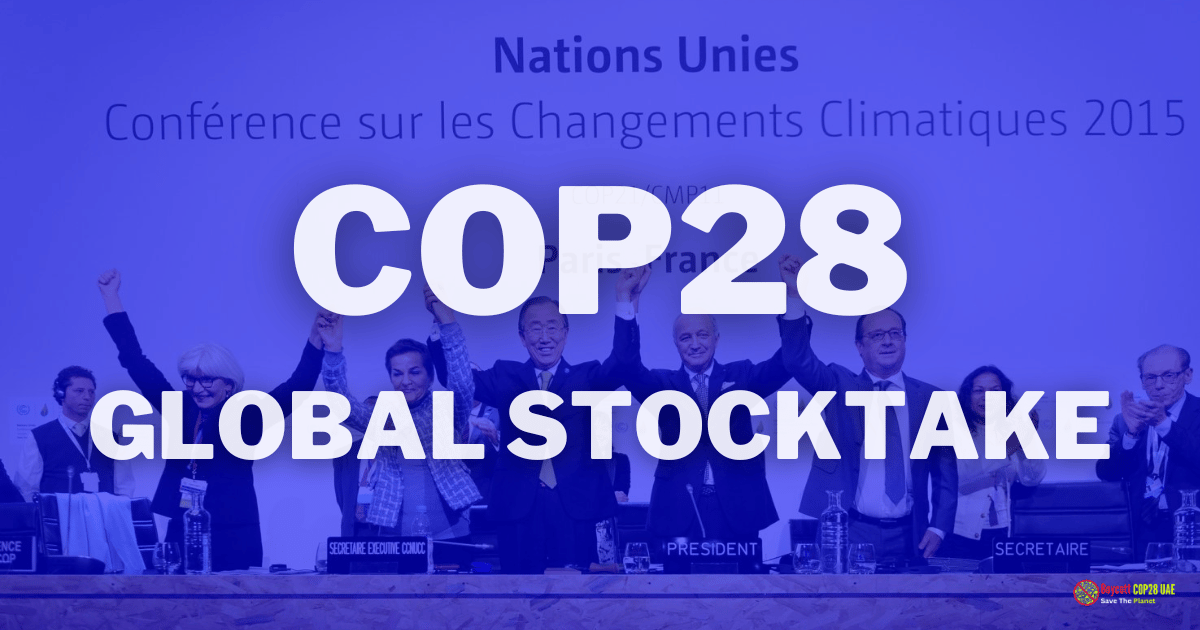COP28 Global Stocktake will provide a comprehensive review of the current state of climate action, including an analysis of the progress made towards achieving the goals set out in the Paris Agreement. It will also provide an opportunity for countries to assess their own efforts, identify areas where they can improve, and make commitments to reduce emissions further and adapt to climate change’s impacts. If you are seeking to expand your understanding of the COP28 Global stocktake process, we invite you to peruse the following guide.
Global Stocktake 2023: What is Global Stocktake?
According to the executive secretary of UNFCCC, this year’s COP28 Global Stocktake framework is designed to determine climate action’s progress. He uttered these words on Monday at the commencement of the Abu Dhabi Sustainability Week in the UAE.
The Global Stocktake is a necessary procedure that evaluates the advancement made by nations in fulfilling their obligations under the Paris Agreement on climate change at regular intervals.
The inaugural Global Stocktake occurred at COP26 in Glasgow in 2021 and will culminate in 2023. The COP28 Global Stocktake methodology is a two-year process, repeated every five years.
COP28 Global Stocktake Analysis: Importance of GST
The Paris Agreement calls for different countries around the globe to create a strategy to reduce emissions and cope with climate consequences. It also sets a framework for countries to regularly enhance their national climate plans. These plans are called Nationally Determined Contributions (NDCs).
The COP28 Global Stocktake criteria is designed to assist governments in evaluating the progress needed to reach climate plans, pinpoint areas that require further attention to achieve their goals, and uncover prospects to raise their level of ambition in taking climate action.
The COP28 Global Stocktake outcome is crucial because nations still need to fulfill climate commitments, and significant changes are required in all industries to create a sustainable future.
The NDC Synthesis Report from last year revealed that the world needs to be on track to stabilize Global temperature rise at 1.5 degrees. All 192 Parties’ available NDCs indicate a significant increase in Global Greenhouse emissions in 2030, resulting in about 16% more emissions than in 2010.
According to the Intergovernmental Panel on Climate Change, if we do not act quickly to change this, the temperature could rise by approximately 2.7°C during the last year of the century.
The report emphasizes the need for more ambitious action on climate change. Post explained that the Global Stocktake is crucial to addressing this need.
According to Simon Stiell:
As per Stiell, the 2021 Global Stocktake represents the “moment of truth” that comprehensively assesses the current Global climate status and the direction in which it needs to move forward.
The GST is a roadmap to guide interventions for a resilient 1.5 degree Celsius world, sector by sector, region by region, and actor by actor.
It should suggest practical and usable steps for further action. As the COP is far away, I challenge you to try something new this year. Philosophize before negotiating for any entity – gov’t, company, or institution.
What is the world’s real need? How can we make it practical and usable? The GST isn’t enough just because it’s a technical requirement on the calendar but because we decide to seize the chance for fast action and meet the challenge.
What Happens Next?
There are three phases of Global Stocktake
- The first phase is related to collecting the information. This process is continuing. UN Climate Change is collecting data to assess progress via its online portal. Different types of sources are used to collect the information, including scientific studies and the national climate plan
- The second phase is the period of technical assessment. This time period will initialize in June and end in the next year. Organizations will hold in-person talks at UN Climate Conferences to evaluate how much has been done toward the Paris Agreement’s long-term objectives
- At the end of 2023, key findings from the initial Global Stocktake will be presented at COP28. This 3rd phase will include a discussion of the assessment’s results and will provide a significant opportunity to increase climate action and international support






